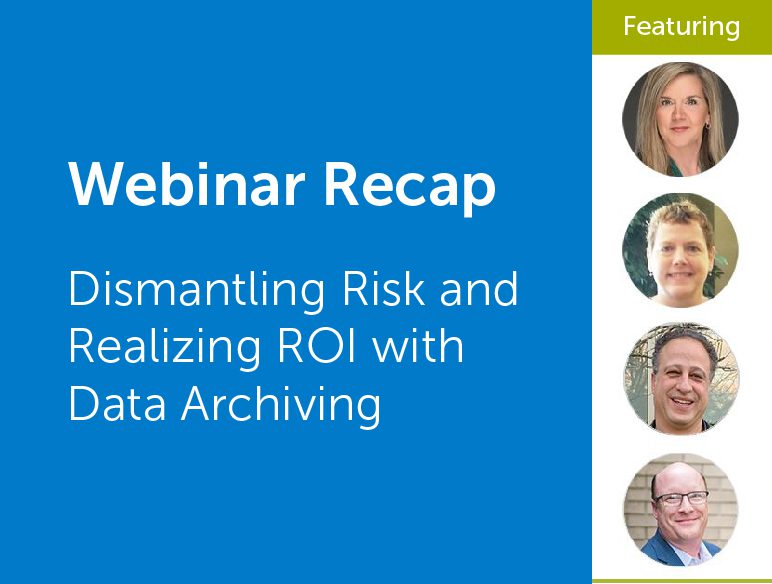
Today’s IT leaders and CISOs are inundated with an everchanging landscape of cyberattack headlines, interoperability challenges and tight IT budgets. While system decommissioning and data archiving projects may not be at the top of the priority list, they are strategic moves to consider to mitigate risk, save money and bolster security.
In a recent webinar, Editor-in-Chief of HealthSystemCIO, Anthony Guerra, sat down with a panel of experts to talk about the advantages of putting legacy data management to work for healthcare provider organizations. The panel featured Tressa Springmann, CIO & SVP of Performance Improvement at LifeBridge Health, Lisa Shubitowski, System Director, Interoperability at Hartford HealthCare, and Harmony Healthcare IT’s Jim Hammer, SVP.
The webinar featured a variety of topics, including how to:
- Understand legacy data management and archiving as an option
- Define your business needs
- Identify how to get the most out of your vendor relationship
Understand Legacy Data Management and Archiving
Like an old box collecting dust in the attic, data that sits in a legacy system for too long is at risk of becoming inaccessible when you need it the most. As applications and servers age, they become more vulnerable to cyberattacks and downtime. As time passes and organizations grow, historical data becomes dispersed amongst more and more disjointed system silos—a true operational challenge for most hospital IT departments.
Harmony Healthcare IT works to help IT leaders clean out the attic so-to-speak. There are several reasons to have a legacy data plan in place:
- Users want it. Inefficient Request for Information workflows cause organizations time and money. With a centralized active archive for legacy record storage, the day-to-day work of the HIM team improves.
- Patients demand it. said they would consider changing their doctor or hospital provider after learning how their health record wasn’t available or shareable. A centralized active archive makes records readily available. This alone should prompt providers to act.
- Hospitals benefit. Monetary, security and user workflow benefits are just a few ways that hospitals win following enterprise-wide data consolidation efforts.
Define Your Business Needs
The best way to start archiving is to step back and identify the business needs. Shubitowski explained that at Hartford Healthcare there were two catalyzing business needs: address the high degree of merger and acquisition activity and rationalize the application portfolio. At LifeBridge Health, Springmann had an organizational goal to retire legacy software that didn’t satisfy and improve workflow support for end-users.
The reasons why an organization needs an archive vary. But leaders that identify and justify the need for system decommissioning and data archiving upfront increase their chances of long-term success.
Harmony Healthcare IT’s team plays a vital role in what Hammer describes as the “playbook.” This is the strategy that is used to successfully archive data and give providers one-click access to legacy information—from out-of-production EHRs, revenue cycle, lab, blood bank. Accounting or materials management systems. Having worked with over 500 healthcare clients, Hammer can attest to Springmann’s point that keeping the patient’s care and satisfaction top of mind – no matter what sort of record type — is the most important part of the effort.
Identify How to Get the Most Out of Your Vendor Relationship
If you’re ready to streamline your data and improve your ROI, the panel recommended several action steps that drive success.
- Secure engagement from leadership and have more than just IT staff on board. Talk to senior leaders, including CFOs, CISOs and CIOs, about why data archiving is a priority and the level of support needed from them. It’s no secret that healthcare systems are strained from a resource standpoint, so always be transparent on the frontend and share the hard and soft cost savings.
- Anticipate any challenges that could occur. Effective legacy data management doesn’t happen overnight. A governance team can help make decisions about how and what data to store. Keep your team informed about what you’re doing and the benefits from doing so.
- Automate and accelerate as much as you can. Hammer said the biggest factor that improves the vendor relationship is for organizational leaders to respond to requests in a timely manner. He also advised that organization leaders shouldn’t shy away from asking questions and providing feedback, as his team is always striving to improve by pivoting on projects instream if necessary.
Want to learn more about how data archiving might be the next step for your organization? Watch the webinar here.







